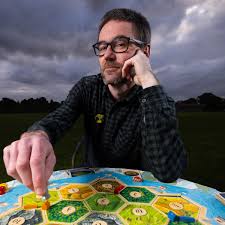
Do you want to start a screaming match with your family during board game night? Realize you’ve been betrayed by your best friend? Ruin the loving relationships you’ve built? If so, for a reasonable $26.79, you can buy the Settlers of Catan.
Created in 1995 by Klaus Tueber, Catan is a four-player game where each player becomes a settler, building and developing their settlements to gain victory points. The game board is made up of hexagonal tiles dubbed hexes, representing “land” the players settle on. Each hex represents one of five resources: wood, brick, sheep, wheat or ore. Settlers can collect these resources by rolling two dice, corresponding to the number on the hex (1-12), and use them to build roads, settlements, upgrade settlements to cities or buy a development card.
Recently, Catan Studios, the producer of Catan, has released many more variations of the original hour long game. Expansion maps with ocean travel and unique new resources have become staple across the Catan community.
However, in my opinion, the original is still the best. After playing Catan at a friend’s house when I was 7, I fell in love with the game and introduced it to my cousins the next Chinese New Year. Eventually, Catan became a beloved yearly tradition.
My cousins and I enjoy it so much because of how interactive it is. Though the game offers only a few simple actions each turn, the opportunities to make trades makes the game much more exciting. Instead of sitting there and waiting for others to finish their turns, players actively debate — or yell — at each other while making trades.
Catan is a team game that forces players to cooperate, but it also requires them to look out for themselves. Since each player can’t obtain every resource they need, they depend on other players to eventually win the game. Everyone has a hidden motive, and if you happen to fall into their trap, you’ll be the subject of utmost embarrassment as I dance around the room pointing and laughing at you. I will never forget the look on my brother’s face when he accidentally traded me the exact resources I needed to win.
Besides working together, you can also impede your tablemate’s actions. An interesting feature in Catan is the Robber. Each time a seven is rolled (the most probable roll with two dice), the player who rolls it is allowed to block one of the hexes and steal a card from one of the players settled on that hex. The Robber allows players to create interesting trades, using a non-block or non steal as a resource to trade for other cards, and can create tension between players.
Case in point — during a family game night, my eldest cousin was ahead by a wide margin, but because the rest of us kept rolling sevens, we were able to block him into oblivion and steal a bunch of important resource cards from him. Steaming mad, he didn’t talk to us for 30 minutes after the game ended.
Ultimately, no player can win with luck alone. Yes, they may be temporarily ahead, but if the rest of the players work together, they can easily prevent a player from winning. When someone does win, it’s probably because you made a bad trade and gave them something they needed for nothing at all. So, don’t be so mad when you lose, because it was definitely your fault somewhere along the way.


























Martin • Dec 14, 2024 at 2:56 am
It seems like this article is comparing Catan to Monopoly and Scrabble, rather than comparing it to the tens of thousands of board games that have come out since 1995. Try Coup, try Pandemic and Pandemic Legacy, try Clank or Fantasy Realms. Check out Board Game Geek or Shut Up and Sit Down to see so many options.
If you like Catan then you are really letting yourself down by not exploring further.